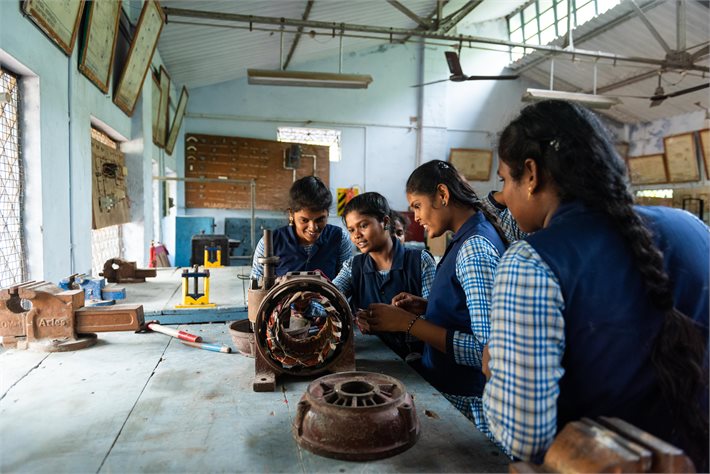
Vocational Training Centres: Pathways out of poverty
Young people affected by leprosy start their lives with several disadvantages that can make it impossible for them to break out of the cycle of poverty.
In India, as in many parts of the world, the stigma attached to leprosy creates enormous barriers. This means that people affected by the disease are often unable to enjoy the freedoms available to others.
They need skills to access job opportunities, but it’s difficult when they may have been forced to drop out of school, or their families can’t afford to pay for further education. This can lead to them feeling more isolated from society, unable to realise their full potential.
Nagajothi was diagnosed with leprosy when she was 14 years old. Thankfully, her symptoms were recognised early, and she was given the cure. But despite this, she still experienced stigma from the community.
Friends and even relatives shunned her. Nagajothi was devastated. And as her parents struggled to get by, she feared for her future. Like any teenage girl, Nagajothi had dreams. But with leprosy and poverty stacked against her, she didn’t feel optimistic.
An amazing breakthrough came when Nagajothi was offered the opportunity to study at a Leprosy Mission Vocational Training Centre (VTC).
These further education centres provide training for young people affected by leprosy, giving them the skills to get a job that will provide stable employment.
When Nagajothi found out about the VTC, she knew that nothing could stop her from going and she’s now working hard at her course, training to be an electrician. “With this education, I will change the world, I'm telling you,” she said.
VTCs teach a variety of courses including banking and insurance, nursing, computer programming, sewing technology, diesel mechanics, electrical training, motor vehicle mechanics, printing and welding. These courses focus on providing students with hands-on training, which leads to a nationally recognised qualification. They also focus on equipping students with core life skills such as critical thinking, problem-solving, decision-making, communication, and leadership.
Each VTC has links with local businesses, ensuring that most young people get a job as soon as their courses finish.
They also encourage graduates to keep in touch with each other as they develop their careers and feedback on employment practices at the companies they’re working for, ensuring that they’re treated fairly and not discriminated against.

New confidence, new goals
Nagajothi’s dream is to become a self-employed electrician, but she is planning on getting a government job first. “I want to help encourage other young people to get training, particularly young women and others with leprosy too – to show them that this is possible,” she told us.
Education is a fundamental human right. However, there are over 260 million children around the world who are out of the classroom – many because of disability, poverty or discrimination.
Young people like Nagajothi have the potential to soar and with the right support, they can. But there are so many more young people like her who are waiting for someone to give them a chance. The opportunities are there, waiting for them.
And you can help them achieve their dreams. With a gift to support a student at a Vocational Training Centre, you can make sure more young people like Nagajothi can break out of the cycle of poverty, growing their confidence and giving them hope. Today, your gift can change someone’s future.
